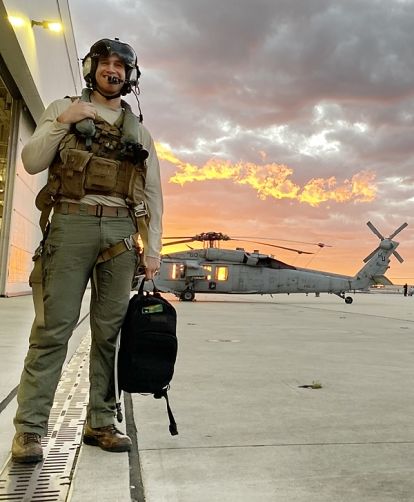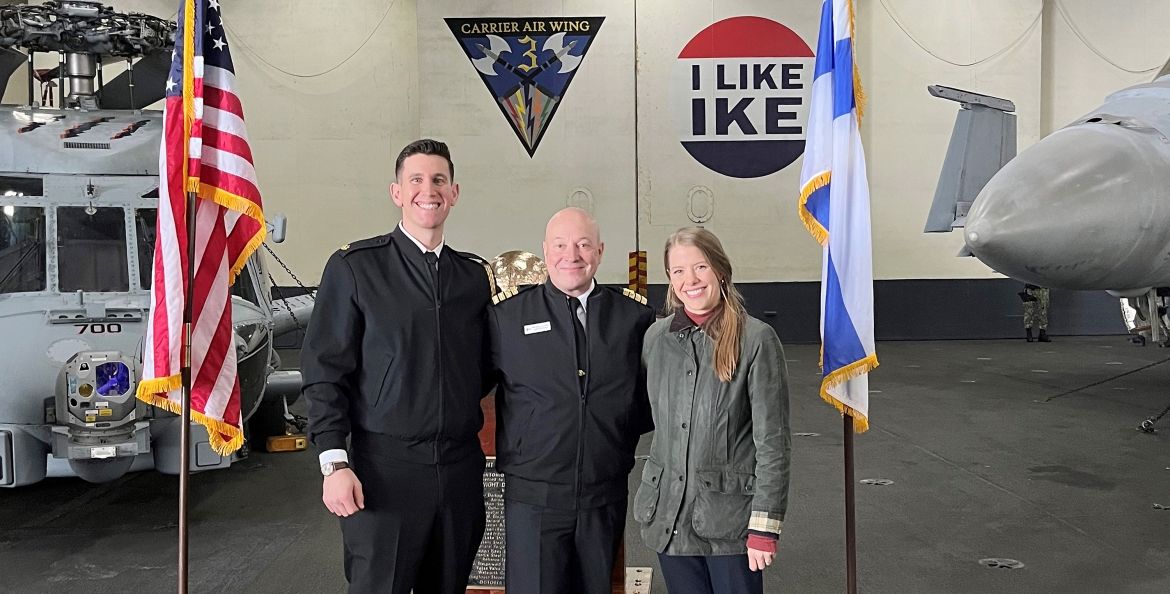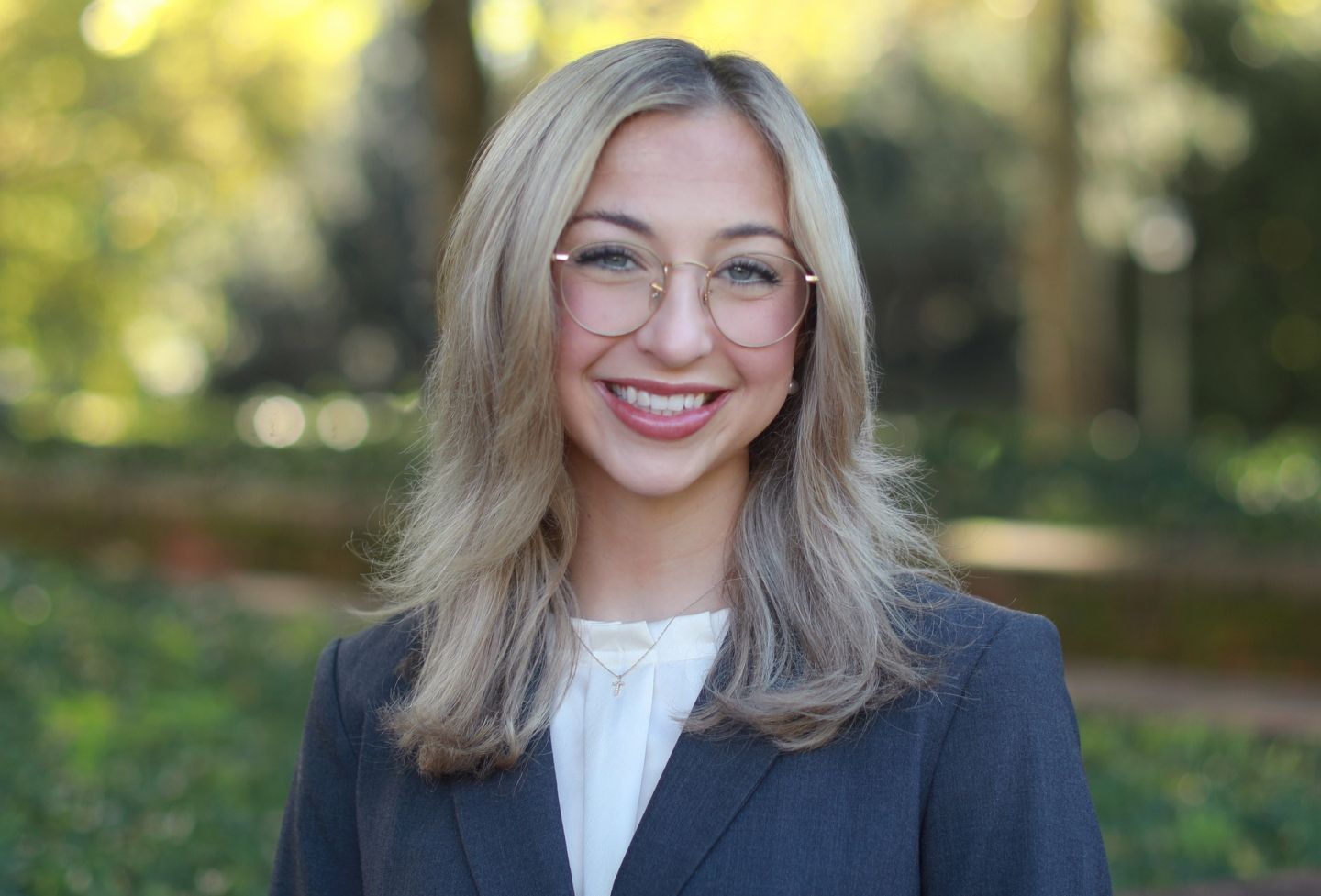Lt. Cmdr. Eli Sinai became a Navy pilot by accident.
That’s how he jokingly explains how someone connected to the “Top Gun” sequel could end up as a first-year law student at the University of Virginia School of Law after 10 years of active service. With Veterans Day approaching, he reflected on the path that led him from dreaming of being a doctor to his new dream of serving the United States through the legal system.
Sinai, who grew up in Rockville, Maryland, had no family connections to the military, and service wasn’t something on his mind. But he was influenced by mentors like his high school track and field coach, an Army Reserve sergeant who steered him in the direction of military service and taught him the value of discipline. The idea of being a military doctor — specifically, a flight surgeon — stuck in his mind.
He attended the University of Maryland on a Reserve Officers’ Training Corps scholarship, majoring in neurobiology and physiology. While on summer training, he remembers seeing the original “Top Gun” for the first time. By then, he had started thinking about a career in aviation and the film affirmed his determination.
On top of that, “I hated pre-med,” Sinai said.
Unfortunately, his scholarship was tied to the degree, so he stuck it out while remaining focused on eventually earning his wings. “I liked the community and quickly learned that I wanted to become a pilot,” he said.
Even though it hadn’t been the plan, it seemed right. “I kind of fell into it … a happy accident.”
The first time he stepped into the cockpit of a plane to begin his training, Sinai wondered if he had made the right choice. “I was pretty slow to pick it up and thought, ‘Is this really what I want to do with my life?’”
Training as a student naval aviator was the most challenging thing he had ever done — as was every single step after that. “It takes a mindset switch. I had to learn to adapt,” Sinai said.
He got the hang of it after a while and the practice of challenging himself paid dividends.
“I have encountered a lot of emergency situations,” Sinai said. “You feel your blood pressure go up ... but you [have to] attack it cool, calm and collected, trust your training and rely on your experience.”

He recalled one flight in which his team was flying over the Strait of Hormuz, a hotly contested area and geopolitical flashpoint in the Middle East. Iranian fast boats armed with mounted machine guns zipped below their MH-60 Seahawk.
To keep a cool head in such a tense situation, he relied on his crew just as much as his training. “These are people I trust with my life … whether it’s a basic training flight in Norfolk or a transit over the Strait of Hormuz,” he said.
Sinai said the Navy matured him and forged his identity alongside his good-humored crew mates, with whom he did virtually everything. “We keep things light … you have to,” Sinai said. “We have fun on deployment. We got to travel the world and see some amazing places.”
While stationed in San Diego, Sinai’s squadron was assigned to a three-week detachment on the USS Theodore Roosevelt aircraft carrier, performing regular operations. But there was one wrinkle: The “Top Gun” sequel’s crew would be filming onboard.
Sinai and company were told to continue with their mission and pretend the cameras weren’t there.
That may have been hard to do when Miles Teller and Glen Powell stopped by his squadron’s ready room, chatting and sharing jokes. “They were really great guys,” Sinai said.
For the scenes set on the aircraft carrier and flight deck, the crew captured Sinai’s air wing as they conducted flight operations.
“There’s about a half of a second where an MH-60 Sierra helicopter pops up on the screen, but you don’t see any faces,” he said. “So I can’t prove I was in ‘Top Gun: Maverick,’ but I can’t prove I wasn’t.”
Other colleagues have their own claims to fame. Retired Capt. J.J. “Yank” Cummings was the film’s first technical adviser and a mentor to Sinai. Cruise borrowed Cummings’ personal catchphrase — “I don’t sail boats, Penny; I land on them” — for his own character. And a friend of Sinai’s tackled Cruise during the filming of the football scene, but the footage didn’t end up making the cut.
Sinai did have a personal role in the crew’s departure. As the squadron’s assistant operations officer, he helped coordinate daily flight schedules. As a result, he arranged Cruise’s flight off the ship and the actor signed one of the crewmember’s helmets after landing.
“The movie does a really good job capturing the spirit of naval aviation,” Sinai said. In reality, “It’s not as glamorous. Our call signs aren’t as cool.” (Sinai’s was “Ham” — but you’ll have to ask him why.)
Although the filming was a fun and rewarding experience, the most striking moment he encountered as a fleet pilot was a visit to Chennai, India, as part of Exercise Malabar, an Indo-Pacific military exercise to deepen interoperability between Indian and Japanese partners.
While in India, he encountered a level of poverty he had never seen before. Though the squadron spent only 36 hours in the city, he realized in that short amount of time how much of the world he hadn’t seen and didn’t know about.
The experience also influenced his perceptions of the international law compacts that bind allies together and made him realize that it might provide a better way for him to serve. Once he finished his shore tour, he knew he wanted to go to law school, but he still had nearly two years left of his 10-year active service contract.

It was time to make a plan. Sinai wanted to do something that would make him a more well-rounded, informed and better applicant for law school. He saw an opportunity to work as an aide-de-camp in Norfolk, Virginia, as a good jumping off point for a legal career.
From February 2022 — coinciding with Russia’s invasion of Ukraine — through August of 2023, Sinai was the assistant to a three-star admiral who was the commander of the U.S. Second Fleet. The admiral was responsible for maritime homeland defense in the North Atlantic area and was also the commander of NATO’s only operational headquarters in the U.S.
During that time, Sinai traveled to 16 countries in 16 months, touching down in Europe close to 25 times.
He said it was “incredibly rewarding” to be in the room with the admiral during such a crucial moment in NATO history, as Russia tested the limits of the alliance. He valued “watching the response to Russia’s aggression and seeing the way leaders cooperate, rise to action and ready themselves, should anything spill over into Europe or its backyard,” he said.
Sinai met his wife, Meaghan, in college and had harbored a crush for many years. While on deployment on the USS Nimitz in support of Operation Inherent Resolve, he wrote her a letter boldly professing his feelings. Thankfully, she felt the same, and they married in 2019.
After nonstop travel and deployments over the past few years, when it came time to choose where he and his wife would move for him to attend law school, he put the ball in her court, secretly hoping she would choose Charlottesville. Besides being attracted to the school for its excellent academic reputation, Sinai was born in Northern Virginia and he and his wife would often visit Charlottesville during his Norfolk detail to enjoy the wineries and picturesque hiking trails.
While he’s enjoyed loosening up his dress code and facial hair, his experience creating and maintaining a tight calendar as the admiral’s aide has helped him maintain discipline in studying. He is also still a Navy reservist.
Only time — and final exams — will tell how well his military skills have served him, but he’s keeping his cool about the tests. “Nothing is as stressful as flying in the pitch-black night onto a rocking ship,” he said.
Although his assignments were sometimes dangerous, he never served in combat. “I want to acknowledge that for so many others, that’s not the case,” he said. Sinai remains a Navy reservist.
He sees Veterans Day as a time to support veterans and reflect on the struggles that many of them endure, such as mental health struggles and complications transitioning from active service.
“I’m proud of my time spent in the Navy,” he said. “And I’m equally proud to be a small part of an outstanding group of veterans here at the law school who are committed to service and who reflect the best in all of us.”
Founded in 1819, the University of Virginia School of Law is the second-oldest continuously operating law school in the nation. Consistently ranked among the top law schools, Virginia is a world-renowned training ground for distinguished lawyers and public servants, instilling in them a commitment to leadership, integrity and community service.


